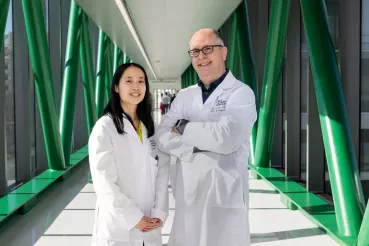As a genetic counselor for the Rush University Cancer Center, I help our patients understand their risk of developing breast cancer by discussing the role of genetics in that risk.
I have always had an interest in genetics, and I enjoy being able to help patients understand this complex information as well. While there are many different areas in health care that genetic counselors can be involved in, I found myself drawn to the cancer setting because there are concrete things that we can do for patients who are identified to be at a higher risk. I believe the genetic counseling and testing process is an empowering one for patients. It can be a way for them to take some control over the situation.
Breast cancer risk assessment
When you come to any of our Rush locations for breast cancer screening, you will be offered the option of doing a breast cancer risk assessment. This assessment looks at your lifetime and five-year risk of developing breast cancer, as well as if you might be an appropriate candidate for genetic counseling and/or genetic testing.
If you choose to do the risk assessment, our technicians will ask you specific questions about your personal health history. The program is designed to uncover your hormonal risk factors. So, we’ll ask you questions like, how old were you when you had your first period, how old were you when you had your first child, and so on. And, of course, we’ll ask questions about your family history.
We then take all of that information and input it into multiple risk models that help us identify if you have a higher risk of developing breast cancer — and if you would be an appropriate candidate for additional breast cancer management, genetic counseling and/or genetic testing. If those risks are high enough, we’ll refer you to our high-risk breast cancer clinic, where you’ll meet with one of our high-risk breast providers and/or genetic counselors.
Understanding your risk
We really want to help you understand why you have a higher risk and what are we going to do to help you, such as additional screening like breast MRI (including fast MRI, which can be done in 10 to 15 minutes), risk-reducing medications and, in some cases, risk-reducing surgeries. We understand that these can definitely be scary things to talk about. So, we make sure you understand your options and that you are part of making the decision for yourself.
We really stress that these are not things that must be done; these are steps you can take and are eligible for based on your risk factors. We are committed to helping you make the best, most informed decision for yourself.




